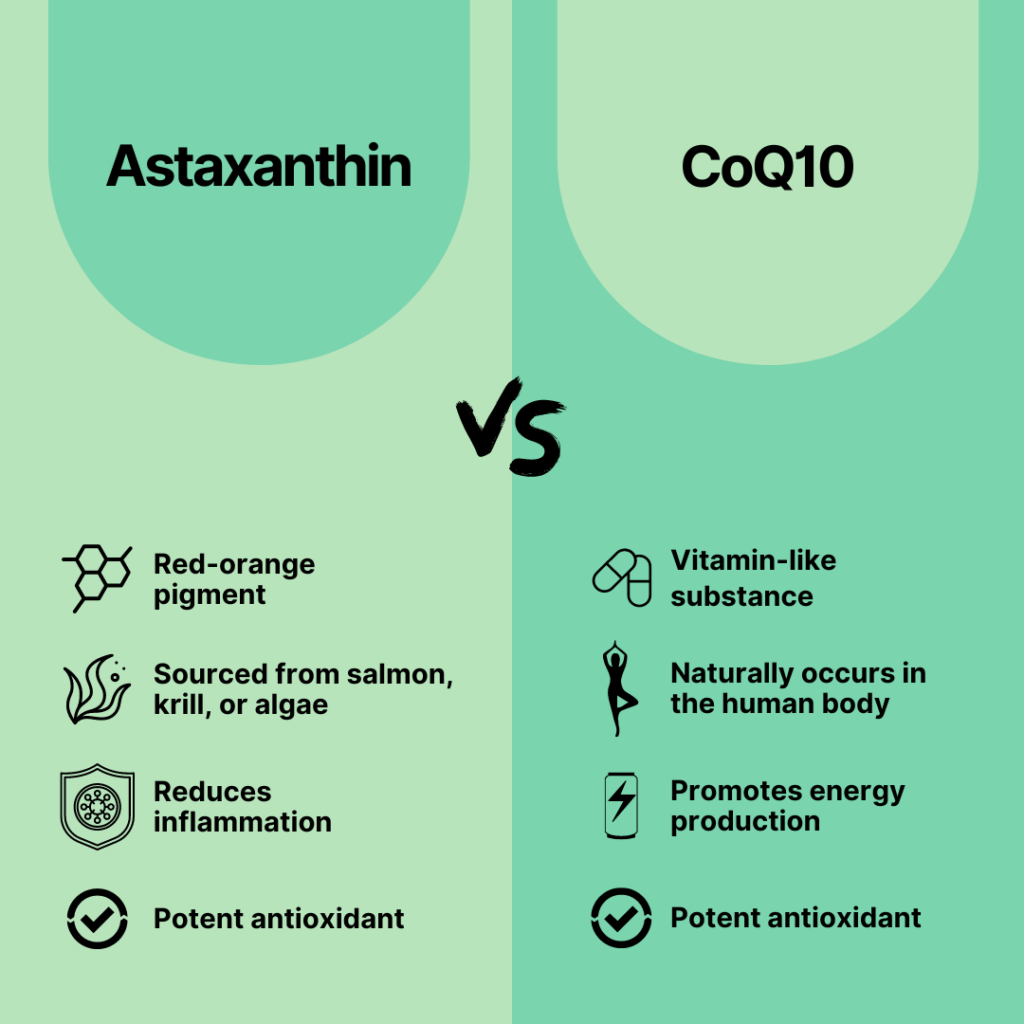When it comes to choosing a powerful antioxidant to help protect against cell damage and support overall health, it can be difficult to decide between Astaxanthin and CoQ10. Both are potent antioxidants, but they have different effects on the body. In this blog post, we will compare Astaxanthin vs CoQ10 to determine which is the better antioxidant. We will look at their different properties, benefits, and side effects to help you decide which one is right for you.
What are Astaxanthin & CoQ10?
Astaxanthin and CoQ10 are both powerful antioxidants that can help protect the body from oxidative stress and support overall health. Astaxanthin is a red-orange pigment found in certain marine organisms like algae, salmon, and krill. It is thought to be one of the most potent antioxidants available, able to neutralize free radicals and scavenge reactive oxygen species. On the other hand, CoQ10, also known as ubiquinone, is a vitamin-like substance that is naturally produced in the human body. Our bodies use CoQ10 to produce cellular energy and fight oxidative stress. While both have powerful antioxidant properties, they have different benefits and side effects and can be used for different purposes.
What are the benefits of each?
Astaxanthin
Astaxanthin is an antioxidant that can help protect your cells from the damage caused by free radicals (1). It has been shown to help reduce inflammation and improve cardiovascular health (2). Additionally, it may help with eye health by improving vision and reducing the risk of age-related macular degeneration (3). Astaxanthin has also been found to provide skin protective properties for UV-induced skin damage (4).
>>Unlock The Benefits Of Astaxanthin Today With Research Verified Astaxanthin
Coq10
CoQ10 is an antioxidant that helps energy production. It is found in higher quantities in cells that require a lot of energy, such as those of the heart (5). It is also important for cardiovascular health in that it helps regulate blood pressure, reduces inflammation, and supports the formation of new blood vessels. CoQ10 has been found to be helpful in treating chronic fatigue syndrome, and may also be beneficial for neurological conditions like cognitive impairment (6). Additionally, some people take CoQ10 to improve their exercise performance.
>>Try Out Research Verified CoQ10 And Experience The Results For Yourself
Both Astaxanthin and CoQ10 have proven to be effective antioxidants, but which you choose depends on your goals. Astaxanthin is better at reducing inflammation, while CoQ10 is more beneficial for energy production and heart health. Ultimately, both are highly beneficial if you are looking to improve your overall health. It is worth considering adding either (or both) to your diet.
What are the side effects?
When it comes to side effects of Astaxanthin vs Coq10, both are generally considered safe for most individuals. However, it’s important to keep in mind that some people may experience minor side effects when taking either supplement.
Astaxanthin is generally well tolerated; however, some people may experience an increase in bowel movements, stomach discomfort, and stomach pain (7). CoQ10 side effects are rare but can include insomnia or digestive upset (8). Make sure to follow the manufacturer’s directions on the label to minimize the risk of side effects.
Overall, neither Astaxanthin nor CoQ10 has been known to cause serious side effects. However, as with any supplement, it’s important to talk to a doctor before starting any new supplement regimen.
Astaxanthin vs CoQ10: Which Is Better?
When it comes to choosing between Astaxanthin and CoQ10, it really depends on the individual and their particular needs. Both of these antioxidants have their own unique benefits, but there is no clear-cut answer as to which one is ‘better’. Your health can benefit from adding either or even both of these supplements to your routine.

The Bottom Line
Ultimately, the choice between Astaxanthin vs CoQ10 comes down to personal preference and needs. Each has its own unique benefits and side effects, so it’s important to weigh the pros and cons of each before making a decision. While research into both of these powerful antioxidants is still ongoing, it’s important to remember that everyone’s body is different and that what works for one person may not work for another. Be sure to talk to your doctor before taking any supplements, and make sure that you are taking the recommended doses for your particular needs.
If you are interested in trying one of these renowned antioxidants, check out Research Verified Astaxanthin and CoQ10. Both come with a 365-day money-back guarantee, so if you are unhappy with your results you can return your bottles for a full refund (not including shipping).



